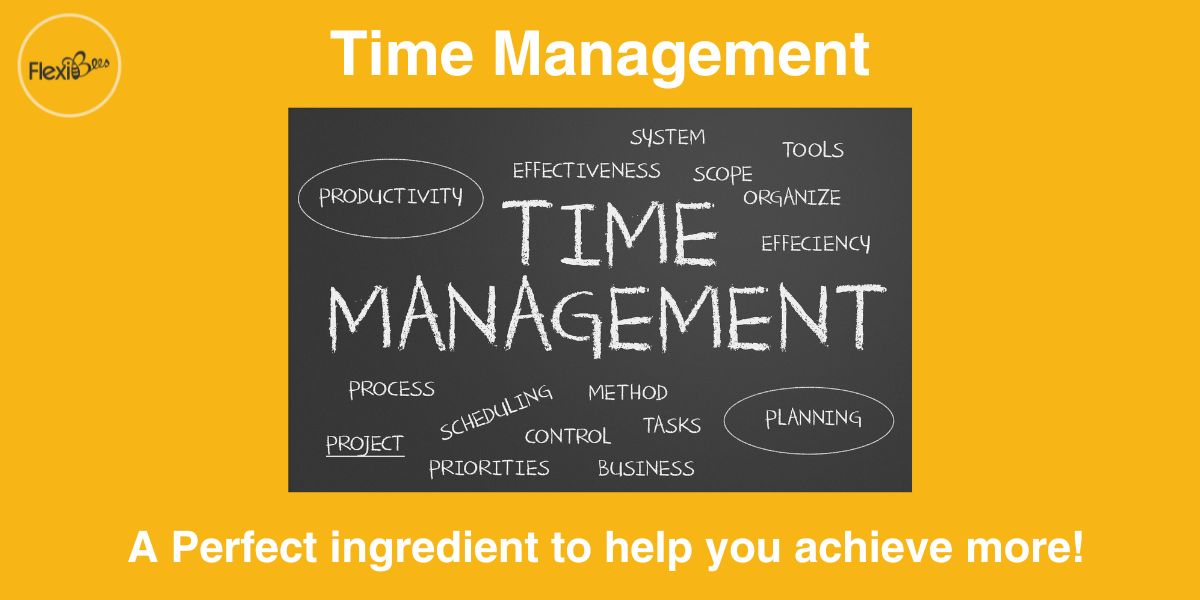Time Management- A Perfect ingredient to help you achieve more
Time management is a very important skill that helps in improving one's productivity and efficiency. The Work from home scenarios needs more of these skills to maximize the output and optimize your work-from-home schedule. This is one skill worth learning and putting to good use. This Blog brings to you the importance of time management skills when working from home and some tips to get better at it.
The Importance of time management in work from home roles
It's important to focus on your time management skills when you are working from home as it can help.
- Increasing productivity: Efficiently managing your time will help you increase your focus and lead to better productivity. This in turn will help you get more work done in less time.
- Accountability: Working from home requires accountability, and setting goals regarding your time helps you accomplish and achieve targets in time, hence increasing your accountability.
- Quality of work: your quality of work gets better if you manage to allocate time to complete the tasks at hand. Leading to better performance.
Tips to manage time when working from home
Some tips on time management to help you manage your work-from-home schedule in a better way,
-
Scheduling
It's really helpful if you create a work schedule for each day. It helps you be in control of the situation and also helps you allocate enough time in case of any hiccups. This also helps in letting your household know when you would be available. Scheduling will also help in planning your other responsibilities at home and personal chores.
For example, you can schedule your work hours from 9:00 am to 13:00 hrs, and lunch hours from 13:00 hrs to 14:00 hrs, and you can block 16:00 hrs to 18:00 hrs for personal tasks. You can put up this schedule for everyone in the house to help ease the functioning.
-
Set goals
You need to set specific goals to keep a track of your schedule and also check on how well you can manage your time. This will also help you improve on certain areas that you feel you are lagging on. The goals you set need to be realistic and achievable in a certain amount of time.
Example: You can begin each day by catching up on your correspondence, checking your emails or limiting your time on social media to 30 mins on a work day.
-
Specific workspace
Having a specific workspace will help you focus more even when working from home. This will help a great deal in avoiding distractions, and your mind is more attuned to the work mode once you are in that space. A designated workspace will also help your brain by telling you what time it is to disconnect from work.
-
Pretend play
You can pretend you are going to work at a conventional in-office workplace once you have a schedule in place. This would be like being on time for work, preparing for it including getting dressed for work. You can also plan a lunch break when you can move away from your workplace to grab a bite. This also means taking breaks throughout the day, including a lunch break.
Keeping distractions at bay
Avoiding getting distracted helps increase productivity and maximize your time and effort ratio. You need to identify your distractions and their sources, then work on a plan to overcome them.
Example: If you get distracted by your toddler’s sounds when he/she is with the nanny try moving your workplace away from the kid's room.
5. To Do list is a must
Creating a to-do list is very helpful as they help you prioritize your work and helps you set a timeline for each task. At the end of the day, it can help you feel accomplished once you tick off all the tasks from the list. In case there are any pending tasks you can put them on the list for the next day and plan your time accordingly. You can create a daily and a weekly to-do list this and can even further bifurcate the list into time blocks. Make sure you always have some time off on these lists. This can help you relax and also work out any contingencies.
6. Prioritize
Identifying and recognising your priorities helps you schedule your tasks and projects accordingly. This will help you meet your targets in a better way. You can list your priorities and rank them and then allocate enough time to each one over the day or the week. This will help you to schedule your week and day in a better and more efficient manner.
7. Decision-making skills
Making the right decision at the right time is pertinent to time management. Like prioritizing you also need to decide which tasks need to be done first and by when. You can allocate your tasks in the following manner:
DO: the tasks that need completion
Delegate: These are tasks that need to be delegated to your team
Defer The task that can be pushed off until you have time.
Delete: You can put the task that you don't need to complete or have completed before time in this category.
8. Tap into your strengths
Finding your strengths will help you manage your time better.
Example: If you feel you work better in the morning, then work on tasks that need more energy and attention in the mornings.
This will help you to complete the tasks in a timely fashion based on the level of your comfort. This will also help you recognise the tasks that you find easier versus those that take more time and effort, making your planning easier.
Hope these few tips help you manage your time better and help you achieve your targets and goals on time.

